Employee Relations and Stakeholder Impact
VerifiedAdded on 2020/10/23
|11
|3769
|448
AI Summary
This assignment delves into the importance of employee relationships in organizational growth, highlighting laws and regulations such as employment acts and minimum wages. It also examines the role of stakeholders like customers, shareholders, and employees, and how employee relations can have both positive and negative impacts on these groups.
Contribute Materials
Your contribution can guide someone’s learning journey. Share your
documents today.
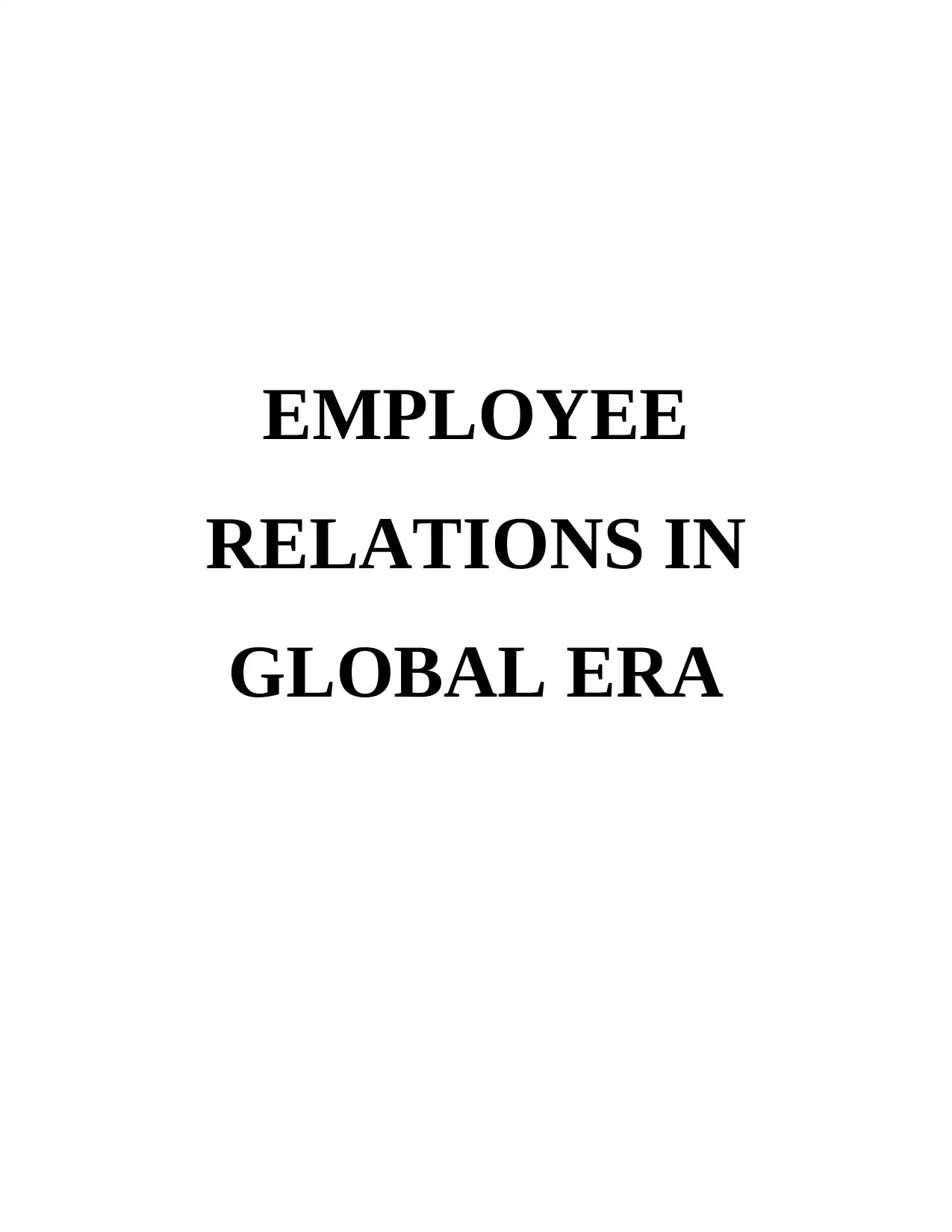
EMPLOYEE
RELATIONS IN
GLOBAL ERA
RELATIONS IN
GLOBAL ERA
Secure Best Marks with AI Grader
Need help grading? Try our AI Grader for instant feedback on your assignments.
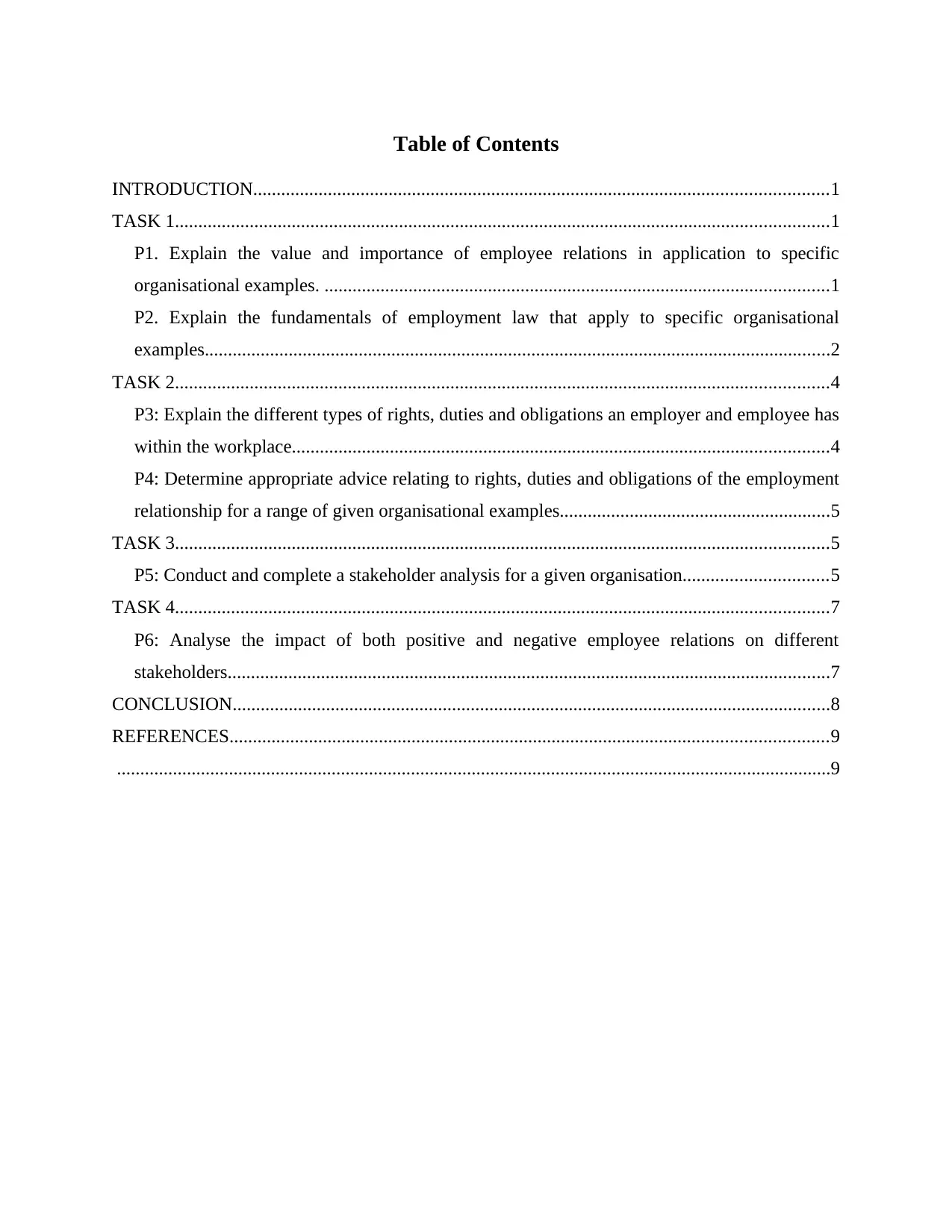
Table of Contents
INTRODUCTION...........................................................................................................................1
TASK 1............................................................................................................................................1
P1. Explain the value and importance of employee relations in application to specific
organisational examples. ............................................................................................................1
P2. Explain the fundamentals of employment law that apply to specific organisational
examples......................................................................................................................................2
TASK 2............................................................................................................................................4
P3: Explain the different types of rights, duties and obligations an employer and employee has
within the workplace...................................................................................................................4
P4: Determine appropriate advice relating to rights, duties and obligations of the employment
relationship for a range of given organisational examples..........................................................5
TASK 3............................................................................................................................................5
P5: Conduct and complete a stakeholder analysis for a given organisation...............................5
TASK 4............................................................................................................................................7
P6: Analyse the impact of both positive and negative employee relations on different
stakeholders.................................................................................................................................7
CONCLUSION................................................................................................................................8
REFERENCES................................................................................................................................9
.........................................................................................................................................................9
INTRODUCTION...........................................................................................................................1
TASK 1............................................................................................................................................1
P1. Explain the value and importance of employee relations in application to specific
organisational examples. ............................................................................................................1
P2. Explain the fundamentals of employment law that apply to specific organisational
examples......................................................................................................................................2
TASK 2............................................................................................................................................4
P3: Explain the different types of rights, duties and obligations an employer and employee has
within the workplace...................................................................................................................4
P4: Determine appropriate advice relating to rights, duties and obligations of the employment
relationship for a range of given organisational examples..........................................................5
TASK 3............................................................................................................................................5
P5: Conduct and complete a stakeholder analysis for a given organisation...............................5
TASK 4............................................................................................................................................7
P6: Analyse the impact of both positive and negative employee relations on different
stakeholders.................................................................................................................................7
CONCLUSION................................................................................................................................8
REFERENCES................................................................................................................................9
.........................................................................................................................................................9
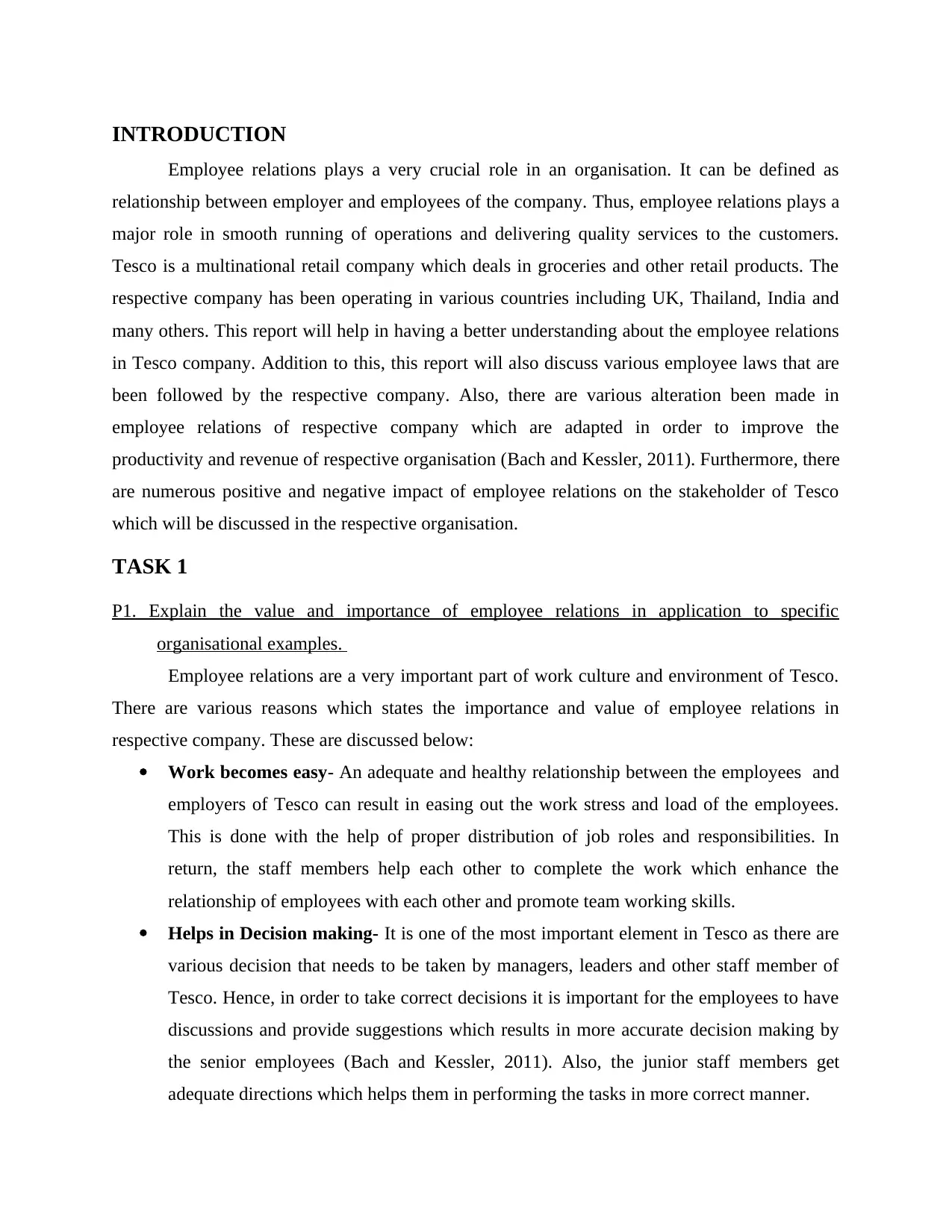
INTRODUCTION
Employee relations plays a very crucial role in an organisation. It can be defined as
relationship between employer and employees of the company. Thus, employee relations plays a
major role in smooth running of operations and delivering quality services to the customers.
Tesco is a multinational retail company which deals in groceries and other retail products. The
respective company has been operating in various countries including UK, Thailand, India and
many others. This report will help in having a better understanding about the employee relations
in Tesco company. Addition to this, this report will also discuss various employee laws that are
been followed by the respective company. Also, there are various alteration been made in
employee relations of respective company which are adapted in order to improve the
productivity and revenue of respective organisation (Bach and Kessler, 2011). Furthermore, there
are numerous positive and negative impact of employee relations on the stakeholder of Tesco
which will be discussed in the respective organisation.
TASK 1
P1. Explain the value and importance of employee relations in application to specific
organisational examples.
Employee relations are a very important part of work culture and environment of Tesco.
There are various reasons which states the importance and value of employee relations in
respective company. These are discussed below:
Work becomes easy- An adequate and healthy relationship between the employees and
employers of Tesco can result in easing out the work stress and load of the employees.
This is done with the help of proper distribution of job roles and responsibilities. In
return, the staff members help each other to complete the work which enhance the
relationship of employees with each other and promote team working skills.
Helps in Decision making- It is one of the most important element in Tesco as there are
various decision that needs to be taken by managers, leaders and other staff member of
Tesco. Hence, in order to take correct decisions it is important for the employees to have
discussions and provide suggestions which results in more accurate decision making by
the senior employees (Bach and Kessler, 2011). Also, the junior staff members get
adequate directions which helps them in performing the tasks in more correct manner.
Employee relations plays a very crucial role in an organisation. It can be defined as
relationship between employer and employees of the company. Thus, employee relations plays a
major role in smooth running of operations and delivering quality services to the customers.
Tesco is a multinational retail company which deals in groceries and other retail products. The
respective company has been operating in various countries including UK, Thailand, India and
many others. This report will help in having a better understanding about the employee relations
in Tesco company. Addition to this, this report will also discuss various employee laws that are
been followed by the respective company. Also, there are various alteration been made in
employee relations of respective company which are adapted in order to improve the
productivity and revenue of respective organisation (Bach and Kessler, 2011). Furthermore, there
are numerous positive and negative impact of employee relations on the stakeholder of Tesco
which will be discussed in the respective organisation.
TASK 1
P1. Explain the value and importance of employee relations in application to specific
organisational examples.
Employee relations are a very important part of work culture and environment of Tesco.
There are various reasons which states the importance and value of employee relations in
respective company. These are discussed below:
Work becomes easy- An adequate and healthy relationship between the employees and
employers of Tesco can result in easing out the work stress and load of the employees.
This is done with the help of proper distribution of job roles and responsibilities. In
return, the staff members help each other to complete the work which enhance the
relationship of employees with each other and promote team working skills.
Helps in Decision making- It is one of the most important element in Tesco as there are
various decision that needs to be taken by managers, leaders and other staff member of
Tesco. Hence, in order to take correct decisions it is important for the employees to have
discussions and provide suggestions which results in more accurate decision making by
the senior employees (Bach and Kessler, 2011). Also, the junior staff members get
adequate directions which helps them in performing the tasks in more correct manner.
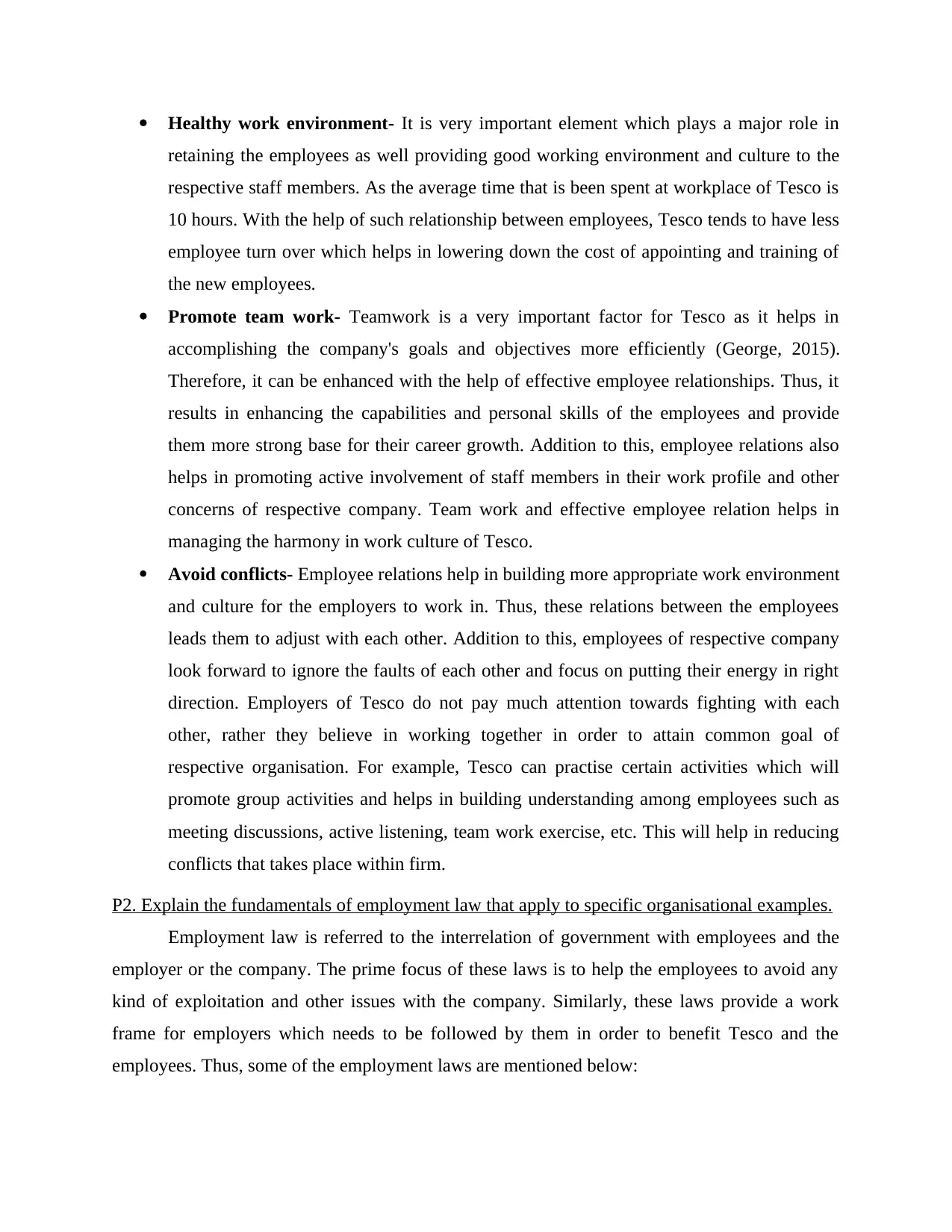
Healthy work environment- It is very important element which plays a major role in
retaining the employees as well providing good working environment and culture to the
respective staff members. As the average time that is been spent at workplace of Tesco is
10 hours. With the help of such relationship between employees, Tesco tends to have less
employee turn over which helps in lowering down the cost of appointing and training of
the new employees.
Promote team work- Teamwork is a very important factor for Tesco as it helps in
accomplishing the company's goals and objectives more efficiently (George, 2015).
Therefore, it can be enhanced with the help of effective employee relationships. Thus, it
results in enhancing the capabilities and personal skills of the employees and provide
them more strong base for their career growth. Addition to this, employee relations also
helps in promoting active involvement of staff members in their work profile and other
concerns of respective company. Team work and effective employee relation helps in
managing the harmony in work culture of Tesco.
Avoid conflicts- Employee relations help in building more appropriate work environment
and culture for the employers to work in. Thus, these relations between the employees
leads them to adjust with each other. Addition to this, employees of respective company
look forward to ignore the faults of each other and focus on putting their energy in right
direction. Employers of Tesco do not pay much attention towards fighting with each
other, rather they believe in working together in order to attain common goal of
respective organisation. For example, Tesco can practise certain activities which will
promote group activities and helps in building understanding among employees such as
meeting discussions, active listening, team work exercise, etc. This will help in reducing
conflicts that takes place within firm.
P2. Explain the fundamentals of employment law that apply to specific organisational examples.
Employment law is referred to the interrelation of government with employees and the
employer or the company. The prime focus of these laws is to help the employees to avoid any
kind of exploitation and other issues with the company. Similarly, these laws provide a work
frame for employers which needs to be followed by them in order to benefit Tesco and the
employees. Thus, some of the employment laws are mentioned below:
retaining the employees as well providing good working environment and culture to the
respective staff members. As the average time that is been spent at workplace of Tesco is
10 hours. With the help of such relationship between employees, Tesco tends to have less
employee turn over which helps in lowering down the cost of appointing and training of
the new employees.
Promote team work- Teamwork is a very important factor for Tesco as it helps in
accomplishing the company's goals and objectives more efficiently (George, 2015).
Therefore, it can be enhanced with the help of effective employee relationships. Thus, it
results in enhancing the capabilities and personal skills of the employees and provide
them more strong base for their career growth. Addition to this, employee relations also
helps in promoting active involvement of staff members in their work profile and other
concerns of respective company. Team work and effective employee relation helps in
managing the harmony in work culture of Tesco.
Avoid conflicts- Employee relations help in building more appropriate work environment
and culture for the employers to work in. Thus, these relations between the employees
leads them to adjust with each other. Addition to this, employees of respective company
look forward to ignore the faults of each other and focus on putting their energy in right
direction. Employers of Tesco do not pay much attention towards fighting with each
other, rather they believe in working together in order to attain common goal of
respective organisation. For example, Tesco can practise certain activities which will
promote group activities and helps in building understanding among employees such as
meeting discussions, active listening, team work exercise, etc. This will help in reducing
conflicts that takes place within firm.
P2. Explain the fundamentals of employment law that apply to specific organisational examples.
Employment law is referred to the interrelation of government with employees and the
employer or the company. The prime focus of these laws is to help the employees to avoid any
kind of exploitation and other issues with the company. Similarly, these laws provide a work
frame for employers which needs to be followed by them in order to benefit Tesco and the
employees. Thus, some of the employment laws are mentioned below:
Secure Best Marks with AI Grader
Need help grading? Try our AI Grader for instant feedback on your assignments.
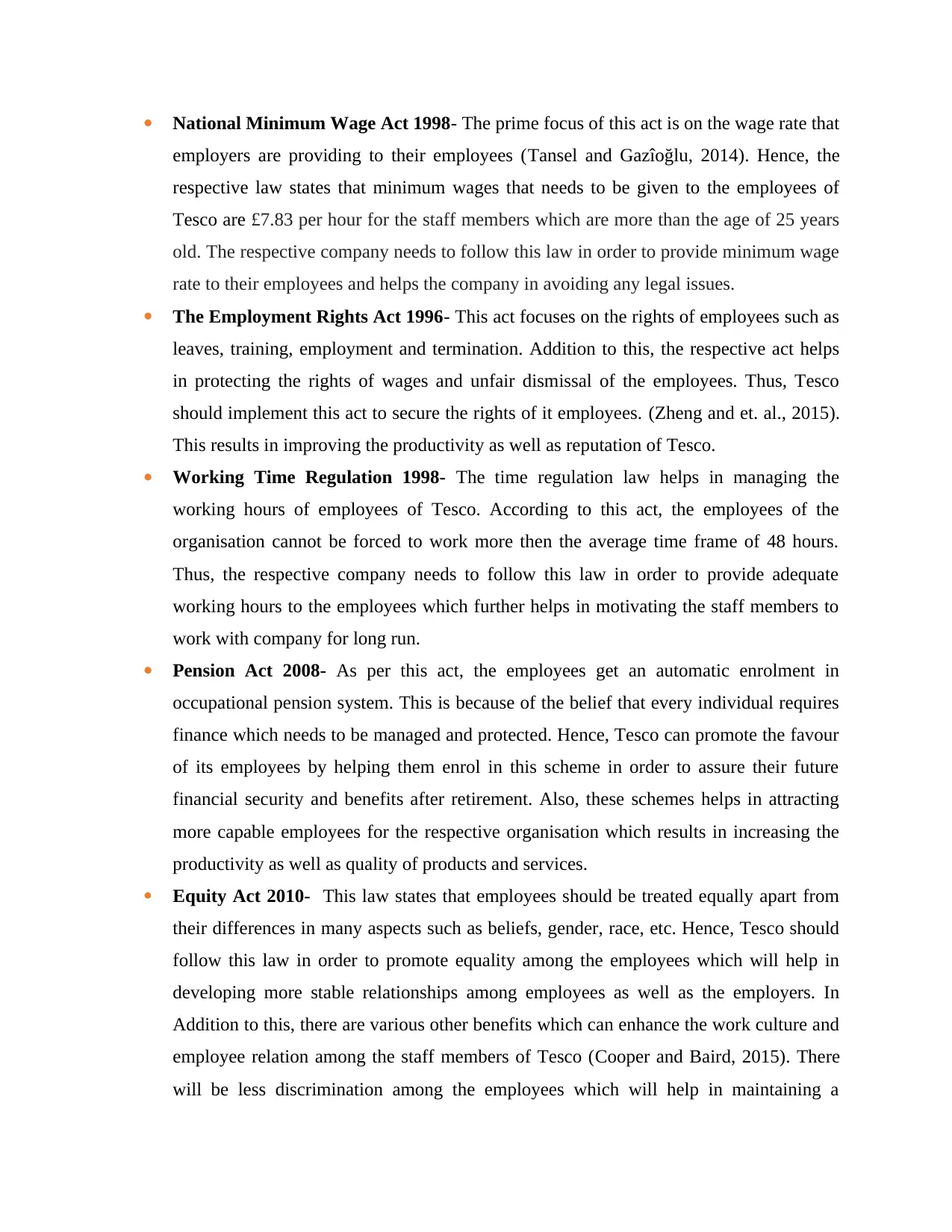
National Minimum Wage Act 1998- The prime focus of this act is on the wage rate that
employers are providing to their employees (Tansel and Gazîoğlu, 2014). Hence, the
respective law states that minimum wages that needs to be given to the employees of
Tesco are £7.83 per hour for the staff members which are more than the age of 25 years
old. The respective company needs to follow this law in order to provide minimum wage
rate to their employees and helps the company in avoiding any legal issues.
The Employment Rights Act 1996- This act focuses on the rights of employees such as
leaves, training, employment and termination. Addition to this, the respective act helps
in protecting the rights of wages and unfair dismissal of the employees. Thus, Tesco
should implement this act to secure the rights of it employees. (Zheng and et. al., 2015).
This results in improving the productivity as well as reputation of Tesco.
Working Time Regulation 1998- The time regulation law helps in managing the
working hours of employees of Tesco. According to this act, the employees of the
organisation cannot be forced to work more then the average time frame of 48 hours.
Thus, the respective company needs to follow this law in order to provide adequate
working hours to the employees which further helps in motivating the staff members to
work with company for long run.
Pension Act 2008- As per this act, the employees get an automatic enrolment in
occupational pension system. This is because of the belief that every individual requires
finance which needs to be managed and protected. Hence, Tesco can promote the favour
of its employees by helping them enrol in this scheme in order to assure their future
financial security and benefits after retirement. Also, these schemes helps in attracting
more capable employees for the respective organisation which results in increasing the
productivity as well as quality of products and services.
Equity Act 2010- This law states that employees should be treated equally apart from
their differences in many aspects such as beliefs, gender, race, etc. Hence, Tesco should
follow this law in order to promote equality among the employees which will help in
developing more stable relationships among employees as well as the employers. In
Addition to this, there are various other benefits which can enhance the work culture and
employee relation among the staff members of Tesco (Cooper and Baird, 2015). There
will be less discrimination among the employees which will help in maintaining a
employers are providing to their employees (Tansel and Gazîoğlu, 2014). Hence, the
respective law states that minimum wages that needs to be given to the employees of
Tesco are £7.83 per hour for the staff members which are more than the age of 25 years
old. The respective company needs to follow this law in order to provide minimum wage
rate to their employees and helps the company in avoiding any legal issues.
The Employment Rights Act 1996- This act focuses on the rights of employees such as
leaves, training, employment and termination. Addition to this, the respective act helps
in protecting the rights of wages and unfair dismissal of the employees. Thus, Tesco
should implement this act to secure the rights of it employees. (Zheng and et. al., 2015).
This results in improving the productivity as well as reputation of Tesco.
Working Time Regulation 1998- The time regulation law helps in managing the
working hours of employees of Tesco. According to this act, the employees of the
organisation cannot be forced to work more then the average time frame of 48 hours.
Thus, the respective company needs to follow this law in order to provide adequate
working hours to the employees which further helps in motivating the staff members to
work with company for long run.
Pension Act 2008- As per this act, the employees get an automatic enrolment in
occupational pension system. This is because of the belief that every individual requires
finance which needs to be managed and protected. Hence, Tesco can promote the favour
of its employees by helping them enrol in this scheme in order to assure their future
financial security and benefits after retirement. Also, these schemes helps in attracting
more capable employees for the respective organisation which results in increasing the
productivity as well as quality of products and services.
Equity Act 2010- This law states that employees should be treated equally apart from
their differences in many aspects such as beliefs, gender, race, etc. Hence, Tesco should
follow this law in order to promote equality among the employees which will help in
developing more stable relationships among employees as well as the employers. In
Addition to this, there are various other benefits which can enhance the work culture and
employee relation among the staff members of Tesco (Cooper and Baird, 2015). There
will be less discrimination among the employees which will help in maintaining a
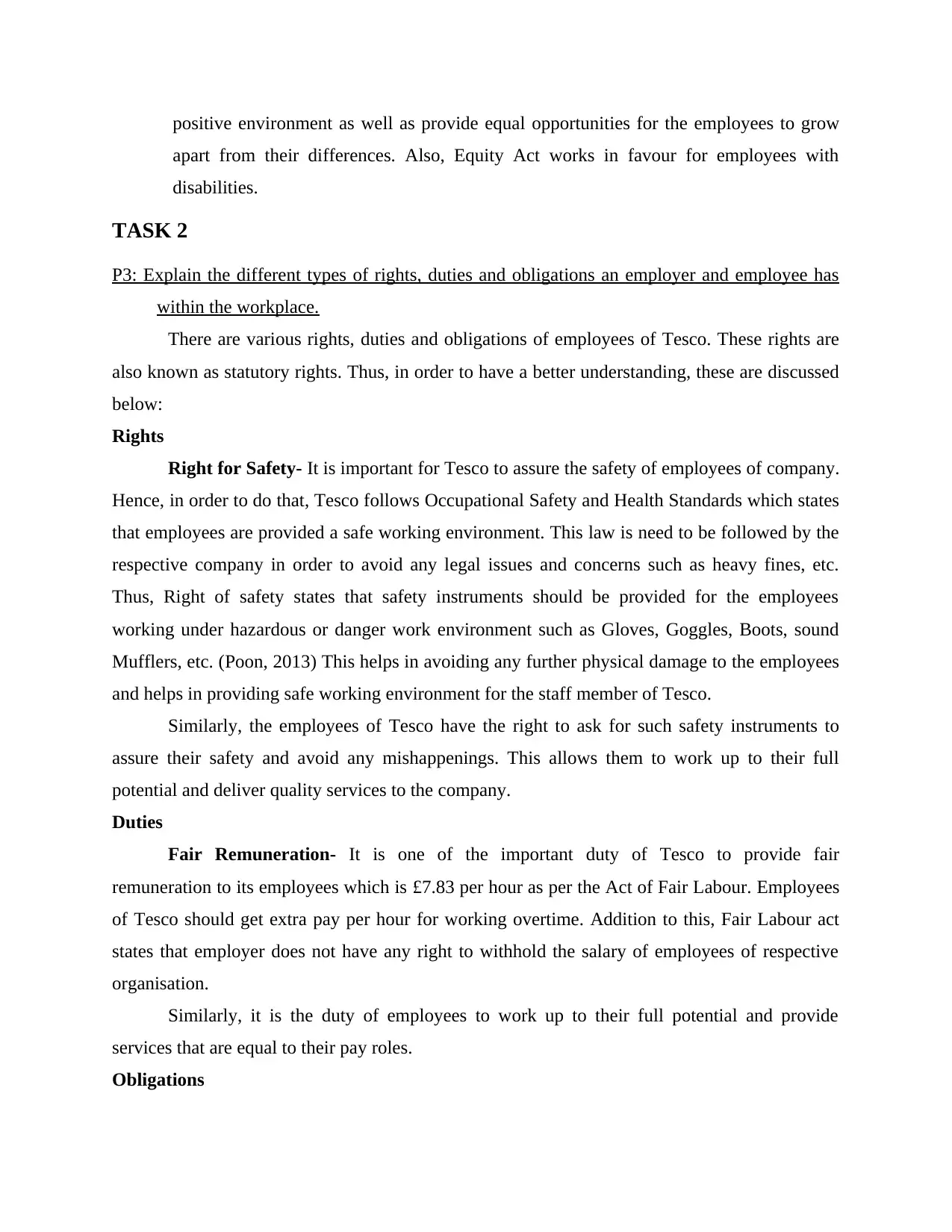
positive environment as well as provide equal opportunities for the employees to grow
apart from their differences. Also, Equity Act works in favour for employees with
disabilities.
TASK 2
P3: Explain the different types of rights, duties and obligations an employer and employee has
within the workplace.
There are various rights, duties and obligations of employees of Tesco. These rights are
also known as statutory rights. Thus, in order to have a better understanding, these are discussed
below:
Rights
Right for Safety- It is important for Tesco to assure the safety of employees of company.
Hence, in order to do that, Tesco follows Occupational Safety and Health Standards which states
that employees are provided a safe working environment. This law is need to be followed by the
respective company in order to avoid any legal issues and concerns such as heavy fines, etc.
Thus, Right of safety states that safety instruments should be provided for the employees
working under hazardous or danger work environment such as Gloves, Goggles, Boots, sound
Mufflers, etc. (Poon, 2013) This helps in avoiding any further physical damage to the employees
and helps in providing safe working environment for the staff member of Tesco.
Similarly, the employees of Tesco have the right to ask for such safety instruments to
assure their safety and avoid any mishappenings. This allows them to work up to their full
potential and deliver quality services to the company.
Duties
Fair Remuneration- It is one of the important duty of Tesco to provide fair
remuneration to its employees which is £7.83 per hour as per the Act of Fair Labour. Employees
of Tesco should get extra pay per hour for working overtime. Addition to this, Fair Labour act
states that employer does not have any right to withhold the salary of employees of respective
organisation.
Similarly, it is the duty of employees to work up to their full potential and provide
services that are equal to their pay roles.
Obligations
apart from their differences. Also, Equity Act works in favour for employees with
disabilities.
TASK 2
P3: Explain the different types of rights, duties and obligations an employer and employee has
within the workplace.
There are various rights, duties and obligations of employees of Tesco. These rights are
also known as statutory rights. Thus, in order to have a better understanding, these are discussed
below:
Rights
Right for Safety- It is important for Tesco to assure the safety of employees of company.
Hence, in order to do that, Tesco follows Occupational Safety and Health Standards which states
that employees are provided a safe working environment. This law is need to be followed by the
respective company in order to avoid any legal issues and concerns such as heavy fines, etc.
Thus, Right of safety states that safety instruments should be provided for the employees
working under hazardous or danger work environment such as Gloves, Goggles, Boots, sound
Mufflers, etc. (Poon, 2013) This helps in avoiding any further physical damage to the employees
and helps in providing safe working environment for the staff member of Tesco.
Similarly, the employees of Tesco have the right to ask for such safety instruments to
assure their safety and avoid any mishappenings. This allows them to work up to their full
potential and deliver quality services to the company.
Duties
Fair Remuneration- It is one of the important duty of Tesco to provide fair
remuneration to its employees which is £7.83 per hour as per the Act of Fair Labour. Employees
of Tesco should get extra pay per hour for working overtime. Addition to this, Fair Labour act
states that employer does not have any right to withhold the salary of employees of respective
organisation.
Similarly, it is the duty of employees to work up to their full potential and provide
services that are equal to their pay roles.
Obligations
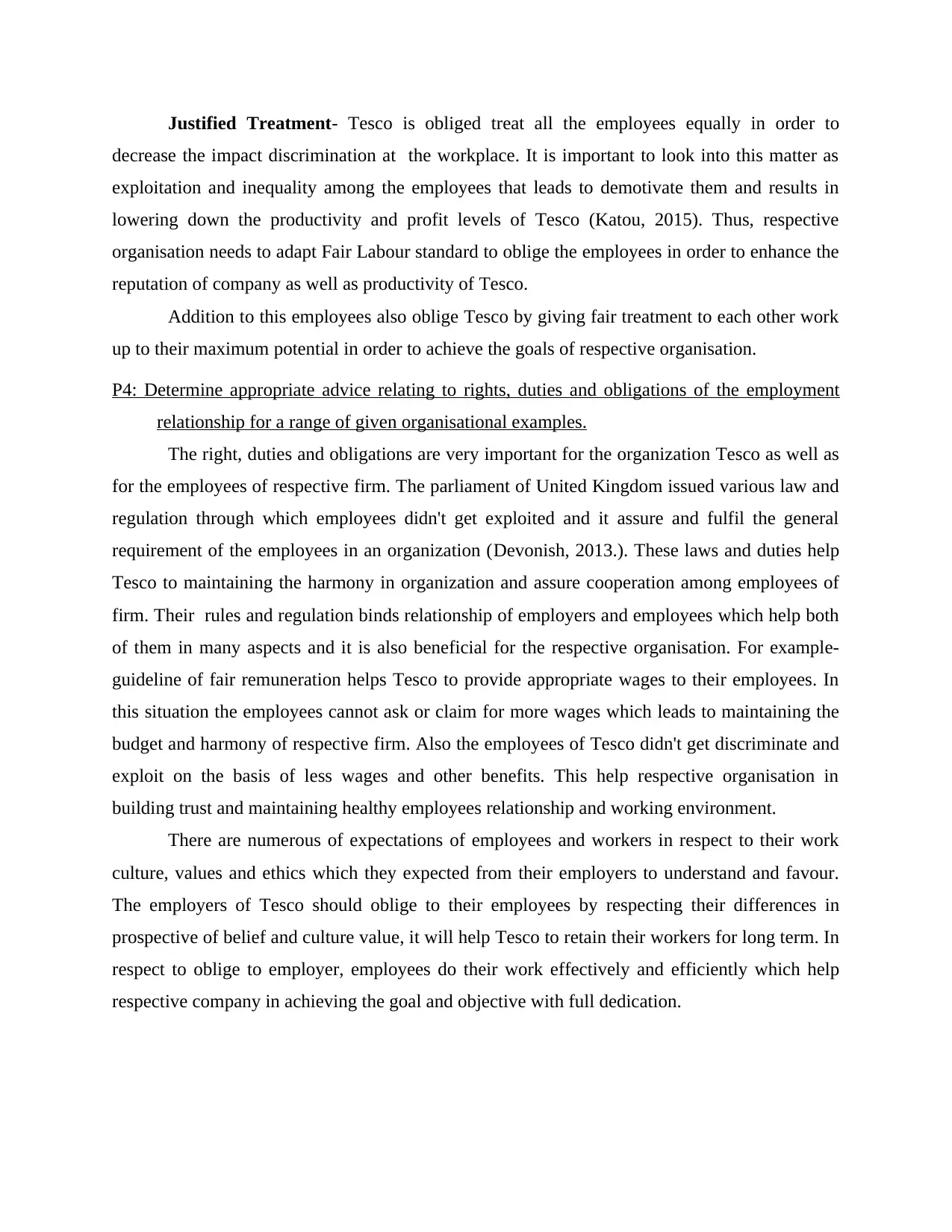
Justified Treatment- Tesco is obliged treat all the employees equally in order to
decrease the impact discrimination at the workplace. It is important to look into this matter as
exploitation and inequality among the employees that leads to demotivate them and results in
lowering down the productivity and profit levels of Tesco (Katou, 2015). Thus, respective
organisation needs to adapt Fair Labour standard to oblige the employees in order to enhance the
reputation of company as well as productivity of Tesco.
Addition to this employees also oblige Tesco by giving fair treatment to each other work
up to their maximum potential in order to achieve the goals of respective organisation.
P4: Determine appropriate advice relating to rights, duties and obligations of the employment
relationship for a range of given organisational examples.
The right, duties and obligations are very important for the organization Tesco as well as
for the employees of respective firm. The parliament of United Kingdom issued various law and
regulation through which employees didn't get exploited and it assure and fulfil the general
requirement of the employees in an organization (Devonish, 2013.). These laws and duties help
Tesco to maintaining the harmony in organization and assure cooperation among employees of
firm. Their rules and regulation binds relationship of employers and employees which help both
of them in many aspects and it is also beneficial for the respective organisation. For example-
guideline of fair remuneration helps Tesco to provide appropriate wages to their employees. In
this situation the employees cannot ask or claim for more wages which leads to maintaining the
budget and harmony of respective firm. Also the employees of Tesco didn't get discriminate and
exploit on the basis of less wages and other benefits. This help respective organisation in
building trust and maintaining healthy employees relationship and working environment.
There are numerous of expectations of employees and workers in respect to their work
culture, values and ethics which they expected from their employers to understand and favour.
The employers of Tesco should oblige to their employees by respecting their differences in
prospective of belief and culture value, it will help Tesco to retain their workers for long term. In
respect to oblige to employer, employees do their work effectively and efficiently which help
respective company in achieving the goal and objective with full dedication.
decrease the impact discrimination at the workplace. It is important to look into this matter as
exploitation and inequality among the employees that leads to demotivate them and results in
lowering down the productivity and profit levels of Tesco (Katou, 2015). Thus, respective
organisation needs to adapt Fair Labour standard to oblige the employees in order to enhance the
reputation of company as well as productivity of Tesco.
Addition to this employees also oblige Tesco by giving fair treatment to each other work
up to their maximum potential in order to achieve the goals of respective organisation.
P4: Determine appropriate advice relating to rights, duties and obligations of the employment
relationship for a range of given organisational examples.
The right, duties and obligations are very important for the organization Tesco as well as
for the employees of respective firm. The parliament of United Kingdom issued various law and
regulation through which employees didn't get exploited and it assure and fulfil the general
requirement of the employees in an organization (Devonish, 2013.). These laws and duties help
Tesco to maintaining the harmony in organization and assure cooperation among employees of
firm. Their rules and regulation binds relationship of employers and employees which help both
of them in many aspects and it is also beneficial for the respective organisation. For example-
guideline of fair remuneration helps Tesco to provide appropriate wages to their employees. In
this situation the employees cannot ask or claim for more wages which leads to maintaining the
budget and harmony of respective firm. Also the employees of Tesco didn't get discriminate and
exploit on the basis of less wages and other benefits. This help respective organisation in
building trust and maintaining healthy employees relationship and working environment.
There are numerous of expectations of employees and workers in respect to their work
culture, values and ethics which they expected from their employers to understand and favour.
The employers of Tesco should oblige to their employees by respecting their differences in
prospective of belief and culture value, it will help Tesco to retain their workers for long term. In
respect to oblige to employer, employees do their work effectively and efficiently which help
respective company in achieving the goal and objective with full dedication.
Paraphrase This Document
Need a fresh take? Get an instant paraphrase of this document with our AI Paraphraser
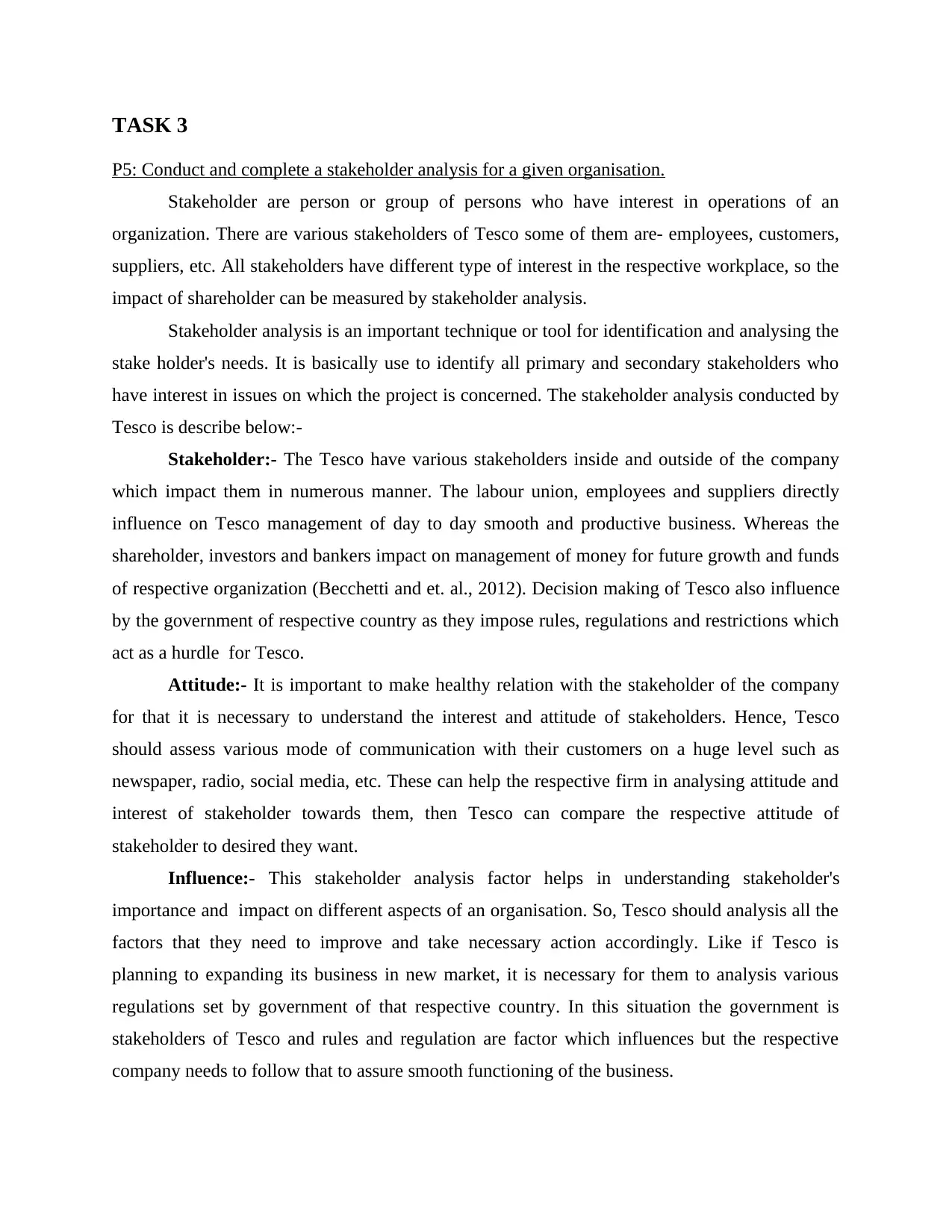
TASK 3
P5: Conduct and complete a stakeholder analysis for a given organisation.
Stakeholder are person or group of persons who have interest in operations of an
organization. There are various stakeholders of Tesco some of them are- employees, customers,
suppliers, etc. All stakeholders have different type of interest in the respective workplace, so the
impact of shareholder can be measured by stakeholder analysis.
Stakeholder analysis is an important technique or tool for identification and analysing the
stake holder's needs. It is basically use to identify all primary and secondary stakeholders who
have interest in issues on which the project is concerned. The stakeholder analysis conducted by
Tesco is describe below:-
Stakeholder:- The Tesco have various stakeholders inside and outside of the company
which impact them in numerous manner. The labour union, employees and suppliers directly
influence on Tesco management of day to day smooth and productive business. Whereas the
shareholder, investors and bankers impact on management of money for future growth and funds
of respective organization (Becchetti and et. al., 2012). Decision making of Tesco also influence
by the government of respective country as they impose rules, regulations and restrictions which
act as a hurdle for Tesco.
Attitude:- It is important to make healthy relation with the stakeholder of the company
for that it is necessary to understand the interest and attitude of stakeholders. Hence, Tesco
should assess various mode of communication with their customers on a huge level such as
newspaper, radio, social media, etc. These can help the respective firm in analysing attitude and
interest of stakeholder towards them, then Tesco can compare the respective attitude of
stakeholder to desired they want.
Influence:- This stakeholder analysis factor helps in understanding stakeholder's
importance and impact on different aspects of an organisation. So, Tesco should analysis all the
factors that they need to improve and take necessary action accordingly. Like if Tesco is
planning to expanding its business in new market, it is necessary for them to analysis various
regulations set by government of that respective country. In this situation the government is
stakeholders of Tesco and rules and regulation are factor which influences but the respective
company needs to follow that to assure smooth functioning of the business.
P5: Conduct and complete a stakeholder analysis for a given organisation.
Stakeholder are person or group of persons who have interest in operations of an
organization. There are various stakeholders of Tesco some of them are- employees, customers,
suppliers, etc. All stakeholders have different type of interest in the respective workplace, so the
impact of shareholder can be measured by stakeholder analysis.
Stakeholder analysis is an important technique or tool for identification and analysing the
stake holder's needs. It is basically use to identify all primary and secondary stakeholders who
have interest in issues on which the project is concerned. The stakeholder analysis conducted by
Tesco is describe below:-
Stakeholder:- The Tesco have various stakeholders inside and outside of the company
which impact them in numerous manner. The labour union, employees and suppliers directly
influence on Tesco management of day to day smooth and productive business. Whereas the
shareholder, investors and bankers impact on management of money for future growth and funds
of respective organization (Becchetti and et. al., 2012). Decision making of Tesco also influence
by the government of respective country as they impose rules, regulations and restrictions which
act as a hurdle for Tesco.
Attitude:- It is important to make healthy relation with the stakeholder of the company
for that it is necessary to understand the interest and attitude of stakeholders. Hence, Tesco
should assess various mode of communication with their customers on a huge level such as
newspaper, radio, social media, etc. These can help the respective firm in analysing attitude and
interest of stakeholder towards them, then Tesco can compare the respective attitude of
stakeholder to desired they want.
Influence:- This stakeholder analysis factor helps in understanding stakeholder's
importance and impact on different aspects of an organisation. So, Tesco should analysis all the
factors that they need to improve and take necessary action accordingly. Like if Tesco is
planning to expanding its business in new market, it is necessary for them to analysis various
regulations set by government of that respective country. In this situation the government is
stakeholders of Tesco and rules and regulation are factor which influences but the respective
company needs to follow that to assure smooth functioning of the business.
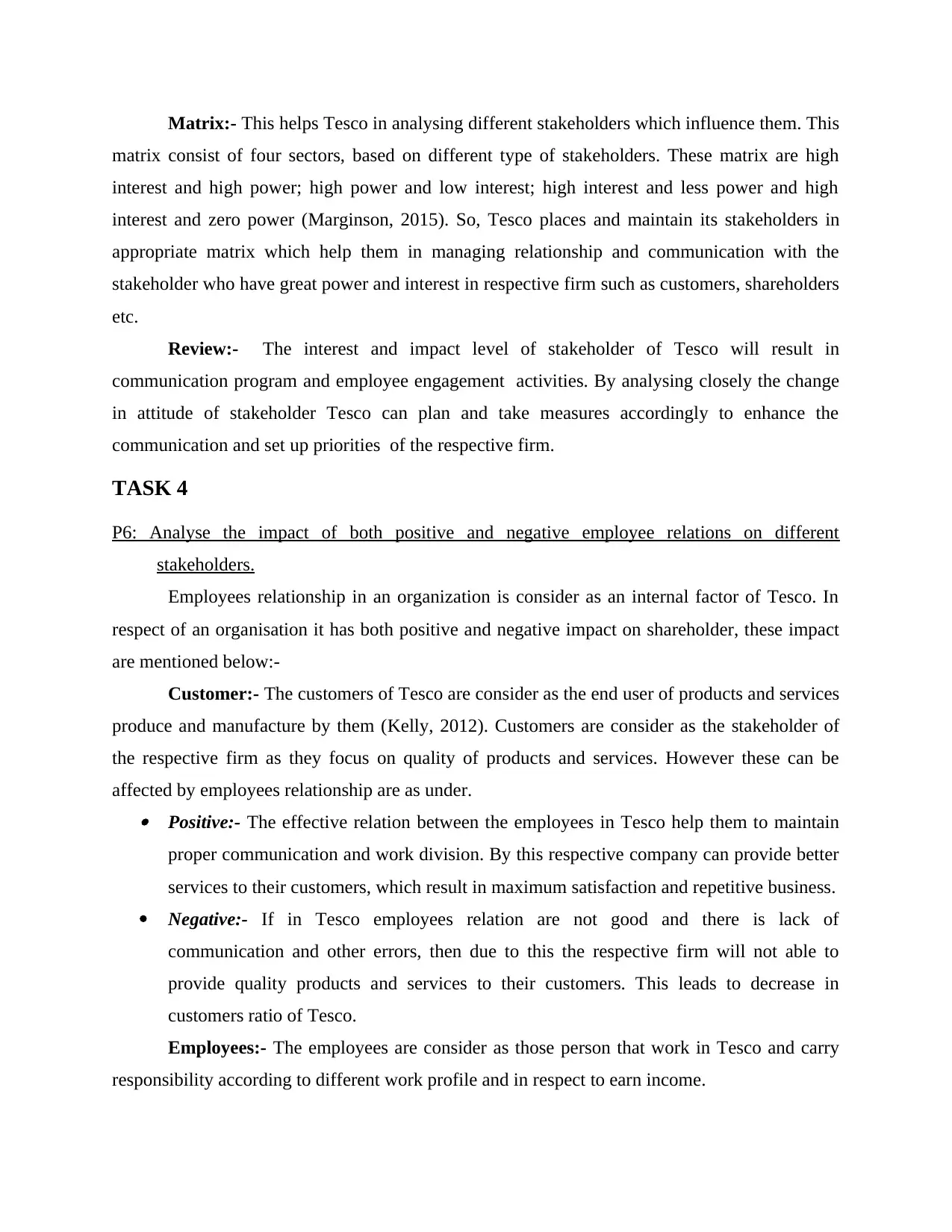
Matrix:- This helps Tesco in analysing different stakeholders which influence them. This
matrix consist of four sectors, based on different type of stakeholders. These matrix are high
interest and high power; high power and low interest; high interest and less power and high
interest and zero power (Marginson, 2015). So, Tesco places and maintain its stakeholders in
appropriate matrix which help them in managing relationship and communication with the
stakeholder who have great power and interest in respective firm such as customers, shareholders
etc.
Review:- The interest and impact level of stakeholder of Tesco will result in
communication program and employee engagement activities. By analysing closely the change
in attitude of stakeholder Tesco can plan and take measures accordingly to enhance the
communication and set up priorities of the respective firm.
TASK 4
P6: Analyse the impact of both positive and negative employee relations on different
stakeholders.
Employees relationship in an organization is consider as an internal factor of Tesco. In
respect of an organisation it has both positive and negative impact on shareholder, these impact
are mentioned below:-
Customer:- The customers of Tesco are consider as the end user of products and services
produce and manufacture by them (Kelly, 2012). Customers are consider as the stakeholder of
the respective firm as they focus on quality of products and services. However these can be
affected by employees relationship are as under. Positive:- The effective relation between the employees in Tesco help them to maintain
proper communication and work division. By this respective company can provide better
services to their customers, which result in maximum satisfaction and repetitive business.
Negative:- If in Tesco employees relation are not good and there is lack of
communication and other errors, then due to this the respective firm will not able to
provide quality products and services to their customers. This leads to decrease in
customers ratio of Tesco.
Employees:- The employees are consider as those person that work in Tesco and carry
responsibility according to different work profile and in respect to earn income.
matrix consist of four sectors, based on different type of stakeholders. These matrix are high
interest and high power; high power and low interest; high interest and less power and high
interest and zero power (Marginson, 2015). So, Tesco places and maintain its stakeholders in
appropriate matrix which help them in managing relationship and communication with the
stakeholder who have great power and interest in respective firm such as customers, shareholders
etc.
Review:- The interest and impact level of stakeholder of Tesco will result in
communication program and employee engagement activities. By analysing closely the change
in attitude of stakeholder Tesco can plan and take measures accordingly to enhance the
communication and set up priorities of the respective firm.
TASK 4
P6: Analyse the impact of both positive and negative employee relations on different
stakeholders.
Employees relationship in an organization is consider as an internal factor of Tesco. In
respect of an organisation it has both positive and negative impact on shareholder, these impact
are mentioned below:-
Customer:- The customers of Tesco are consider as the end user of products and services
produce and manufacture by them (Kelly, 2012). Customers are consider as the stakeholder of
the respective firm as they focus on quality of products and services. However these can be
affected by employees relationship are as under. Positive:- The effective relation between the employees in Tesco help them to maintain
proper communication and work division. By this respective company can provide better
services to their customers, which result in maximum satisfaction and repetitive business.
Negative:- If in Tesco employees relation are not good and there is lack of
communication and other errors, then due to this the respective firm will not able to
provide quality products and services to their customers. This leads to decrease in
customers ratio of Tesco.
Employees:- The employees are consider as those person that work in Tesco and carry
responsibility according to different work profile and in respect to earn income.
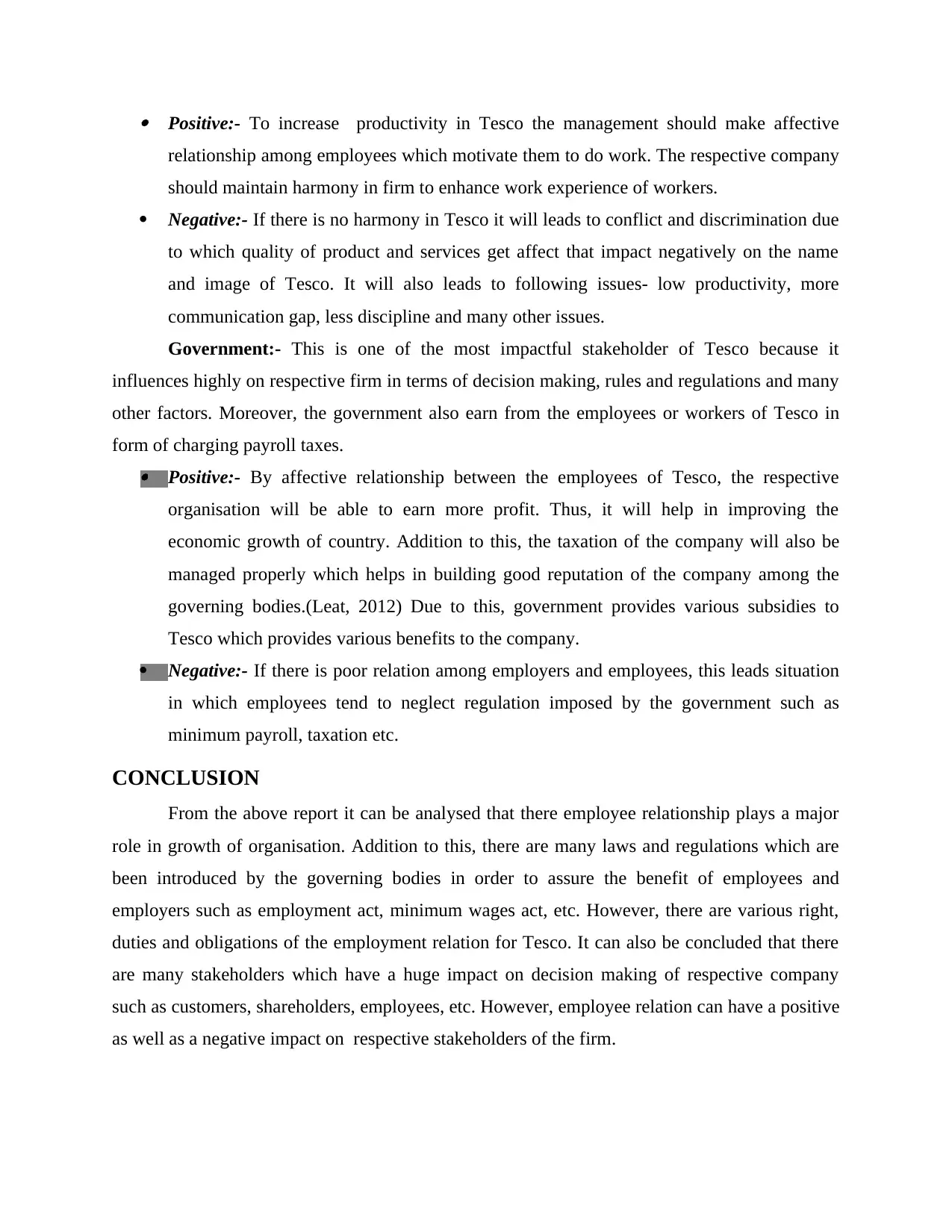
Positive:- To increase productivity in Tesco the management should make affective
relationship among employees which motivate them to do work. The respective company
should maintain harmony in firm to enhance work experience of workers.
Negative:- If there is no harmony in Tesco it will leads to conflict and discrimination due
to which quality of product and services get affect that impact negatively on the name
and image of Tesco. It will also leads to following issues- low productivity, more
communication gap, less discipline and many other issues.
Government:- This is one of the most impactful stakeholder of Tesco because it
influences highly on respective firm in terms of decision making, rules and regulations and many
other factors. Moreover, the government also earn from the employees or workers of Tesco in
form of charging payroll taxes. Positive:- By affective relationship between the employees of Tesco, the respective
organisation will be able to earn more profit. Thus, it will help in improving the
economic growth of country. Addition to this, the taxation of the company will also be
managed properly which helps in building good reputation of the company among the
governing bodies.(Leat, 2012) Due to this, government provides various subsidies to
Tesco which provides various benefits to the company.
Negative:- If there is poor relation among employers and employees, this leads situation
in which employees tend to neglect regulation imposed by the government such as
minimum payroll, taxation etc.
CONCLUSION
From the above report it can be analysed that there employee relationship plays a major
role in growth of organisation. Addition to this, there are many laws and regulations which are
been introduced by the governing bodies in order to assure the benefit of employees and
employers such as employment act, minimum wages act, etc. However, there are various right,
duties and obligations of the employment relation for Tesco. It can also be concluded that there
are many stakeholders which have a huge impact on decision making of respective company
such as customers, shareholders, employees, etc. However, employee relation can have a positive
as well as a negative impact on respective stakeholders of the firm.
relationship among employees which motivate them to do work. The respective company
should maintain harmony in firm to enhance work experience of workers.
Negative:- If there is no harmony in Tesco it will leads to conflict and discrimination due
to which quality of product and services get affect that impact negatively on the name
and image of Tesco. It will also leads to following issues- low productivity, more
communication gap, less discipline and many other issues.
Government:- This is one of the most impactful stakeholder of Tesco because it
influences highly on respective firm in terms of decision making, rules and regulations and many
other factors. Moreover, the government also earn from the employees or workers of Tesco in
form of charging payroll taxes. Positive:- By affective relationship between the employees of Tesco, the respective
organisation will be able to earn more profit. Thus, it will help in improving the
economic growth of country. Addition to this, the taxation of the company will also be
managed properly which helps in building good reputation of the company among the
governing bodies.(Leat, 2012) Due to this, government provides various subsidies to
Tesco which provides various benefits to the company.
Negative:- If there is poor relation among employers and employees, this leads situation
in which employees tend to neglect regulation imposed by the government such as
minimum payroll, taxation etc.
CONCLUSION
From the above report it can be analysed that there employee relationship plays a major
role in growth of organisation. Addition to this, there are many laws and regulations which are
been introduced by the governing bodies in order to assure the benefit of employees and
employers such as employment act, minimum wages act, etc. However, there are various right,
duties and obligations of the employment relation for Tesco. It can also be concluded that there
are many stakeholders which have a huge impact on decision making of respective company
such as customers, shareholders, employees, etc. However, employee relation can have a positive
as well as a negative impact on respective stakeholders of the firm.
Secure Best Marks with AI Grader
Need help grading? Try our AI Grader for instant feedback on your assignments.
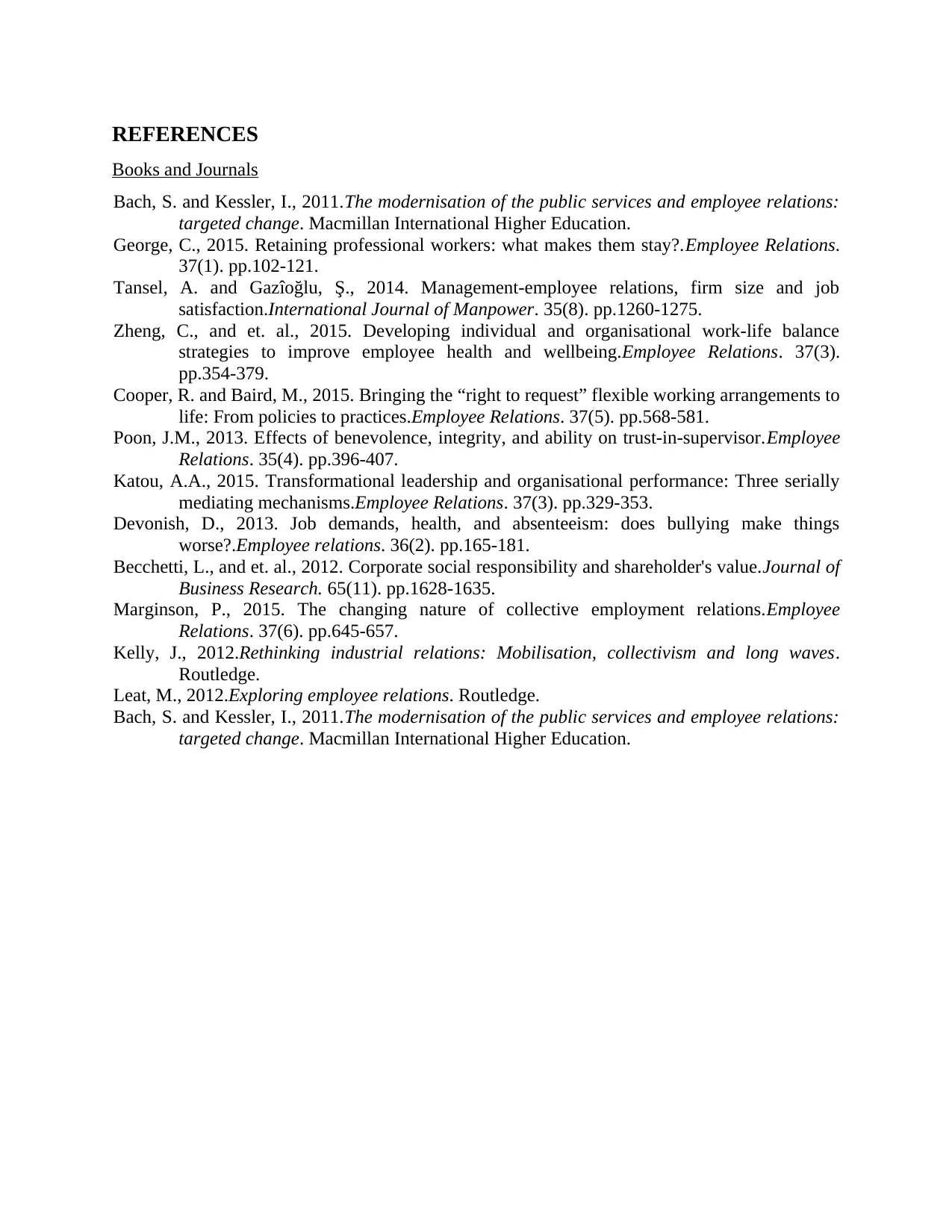
REFERENCES
Books and Journals
Bach, S. and Kessler, I., 2011.The modernisation of the public services and employee relations:
targeted change. Macmillan International Higher Education.
George, C., 2015. Retaining professional workers: what makes them stay?.Employee Relations.
37(1). pp.102-121.
Tansel, A. and Gazîoğlu, Ş., 2014. Management-employee relations, firm size and job
satisfaction.International Journal of Manpower. 35(8). pp.1260-1275.
Zheng, C., and et. al., 2015. Developing individual and organisational work-life balance
strategies to improve employee health and wellbeing.Employee Relations. 37(3).
pp.354-379.
Cooper, R. and Baird, M., 2015. Bringing the “right to request” flexible working arrangements to
life: From policies to practices.Employee Relations. 37(5). pp.568-581.
Poon, J.M., 2013. Effects of benevolence, integrity, and ability on trust-in-supervisor.Employee
Relations. 35(4). pp.396-407.
Katou, A.A., 2015. Transformational leadership and organisational performance: Three serially
mediating mechanisms.Employee Relations. 37(3). pp.329-353.
Devonish, D., 2013. Job demands, health, and absenteeism: does bullying make things
worse?.Employee relations. 36(2). pp.165-181.
Becchetti, L., and et. al., 2012. Corporate social responsibility and shareholder's value.Journal of
Business Research. 65(11). pp.1628-1635.
Marginson, P., 2015. The changing nature of collective employment relations.Employee
Relations. 37(6). pp.645-657.
Kelly, J., 2012.Rethinking industrial relations: Mobilisation, collectivism and long waves.
Routledge.
Leat, M., 2012.Exploring employee relations. Routledge.
Bach, S. and Kessler, I., 2011.The modernisation of the public services and employee relations:
targeted change. Macmillan International Higher Education.
Books and Journals
Bach, S. and Kessler, I., 2011.The modernisation of the public services and employee relations:
targeted change. Macmillan International Higher Education.
George, C., 2015. Retaining professional workers: what makes them stay?.Employee Relations.
37(1). pp.102-121.
Tansel, A. and Gazîoğlu, Ş., 2014. Management-employee relations, firm size and job
satisfaction.International Journal of Manpower. 35(8). pp.1260-1275.
Zheng, C., and et. al., 2015. Developing individual and organisational work-life balance
strategies to improve employee health and wellbeing.Employee Relations. 37(3).
pp.354-379.
Cooper, R. and Baird, M., 2015. Bringing the “right to request” flexible working arrangements to
life: From policies to practices.Employee Relations. 37(5). pp.568-581.
Poon, J.M., 2013. Effects of benevolence, integrity, and ability on trust-in-supervisor.Employee
Relations. 35(4). pp.396-407.
Katou, A.A., 2015. Transformational leadership and organisational performance: Three serially
mediating mechanisms.Employee Relations. 37(3). pp.329-353.
Devonish, D., 2013. Job demands, health, and absenteeism: does bullying make things
worse?.Employee relations. 36(2). pp.165-181.
Becchetti, L., and et. al., 2012. Corporate social responsibility and shareholder's value.Journal of
Business Research. 65(11). pp.1628-1635.
Marginson, P., 2015. The changing nature of collective employment relations.Employee
Relations. 37(6). pp.645-657.
Kelly, J., 2012.Rethinking industrial relations: Mobilisation, collectivism and long waves.
Routledge.
Leat, M., 2012.Exploring employee relations. Routledge.
Bach, S. and Kessler, I., 2011.The modernisation of the public services and employee relations:
targeted change. Macmillan International Higher Education.
1 out of 11
Related Documents
Your All-in-One AI-Powered Toolkit for Academic Success.
+13062052269
info@desklib.com
Available 24*7 on WhatsApp / Email
![[object Object]](/_next/static/media/star-bottom.7253800d.svg)
Unlock your academic potential
© 2024 | Zucol Services PVT LTD | All rights reserved.





